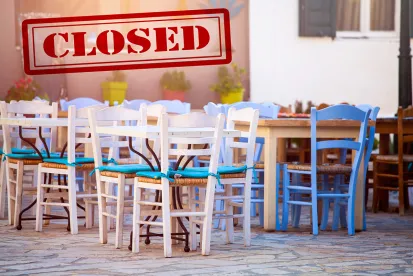Like new cases of COVID-19, the number of business interruption suits appears to be increasing exponentially. In the last few weeks, dozens of plaintiffs in at least six lawsuits across four states have sought insurance coverage for business losses associated with the COVID-19 outbreak. The claims introduce a novel argument that the effects of a pandemic viral outbreak should be covered by standard commercial property policies. Most of the claims rely on “civil authority” provisions that cover losses incurred when a public order in response to covered “damage” denies access to an insured premises. The claims differ in arguing how the outbreak amounts to covered “damage” under their civil authority provisions.
Recent Claims for COVID-19 Losses
A group of Illinois restaurant and theater owners filed a suit in federal district court earlier this week, alleging that Society Insurance wrongfully rejected their business interruption claims after a state order banned dine-in service and ceased theater operations. Unlike lawsuits in other states, the Illinois claim is not merely seeking a declaratory judgment on coverage. Rather, it alleges bad faith on the ground that Society rejected the claim without reasonable investigation.
Days later in Illinois, several restaurants under the “Billy Goat Tavern” brand name brought a similar claim. The Billy Goat plaintiffs argue that the state’s ban on dine-in service caused them a “direct physical loss” and that Society Insurance wrongfully denied their claims. The complaint seeks class certification on behalf of Illinois “on-premises” food and beverage providers that have been denied coverage for losses resulting from the state’s order.
In California and Louisiana, restaurateurs are seeking declaratory judgments that their policies cover business losses related to the COVID-19 outbreak. The claims allege that local and state orders limiting restaurant operations have led to covered business interruption losses, because the orders were in response to “damages” or “causes of loss” caused by the outbreak.
In Oklahoma, petitions for declaratory judgement have been filed by the Chickasaw and Choctaw nations for casino business losses resulting from the outbreak. The Oklahoma petitions do not pursue “civil authority” claims and instead rely solely on the outbreak itself as a form of covered damage.
COVID-19 Outbreak as “Damage” in a Civil Authority Claim
The California and Louisiana lawsuits and one suit in Illinois rely on “civil authority” provisions to claim that they suffered covered losses when a civil order disrupted their businesses. To bring a civil authority claim, plaintiffs must show that a civil order was made in response to a covered “damage” or “loss,” as defined in the policy. The cases vary in arguing how the virus outbreak amounts to covered damage.
The Outbreak as a “Dangerous Physical Condition” Provoking a Government Response
Big Onion Tavern Group, LLC, et al. v. Society Ins., No. 1:20-cv-02005 (N.D. Ill. March 27, 2020)
The Big Onion Tavern plaintiffs argue that the outbreak caused “damage” to nearby properties and that government action in response to the “dangerous physical conditions” interrupted their businesses and caused losses. The plaintiffs rely on Illinois appellate decisions that found the presence of dangerous substances (such as asbestos) to be physical damage. The plaintiffs do not, however, reference any authority where an infection or pathogen amounted to physical damage. Even outside of Illinois, findings that a contamination amounts to damage are extremely rare and refer specifically to a contamination in the insured property.[1]
Of note in the Big Onion case is that at least one policy among the plaintiffs includes coverage for losses incurred when a “contamination” leads a public authority to deny access to the premises. The plaintiffs did not reference the provision in their complaint, potentially because the language seems to suggest such contamination must be present in the covered premises.
A Virus as a “Covered Cause of Loss” to Nearby Properties
French Laundry Partners, LP, dba The French Laundry, et al., v. Hartford Fire Ins. Co., et al. (Calif. Super. Ct., Napa Cnty. March 25, 2020)
In French Laundry Partners, the plaintiffs argue that civil orders limiting restaurant operations and directing residents to shelter-in-place resulted in denied access to their businesses and caused covered losses. The complaint alleges that a “covered cause of loss” at nearby properties invoked the civil response. The complaint alleges that the pandemic is a “covered cause of loss,” because elsewhere in their policy, their properties are covered from “damage caused by virus.”
Viral Outbreaks Not Excluded from “Physical Damage” Coverage
Cajun Conti, LLC, et al., dba Oceana Grill v. Lloyd’s London, et al., No: 2020-0255 (Civ. Dist. Ct. of Orleans Parish March 16, 2020)
The plaintiffs in Oceana Grill argue that state and local orders that limited restaurant seating capacity, set a restaurant curfew, and banned large crowds denied access to their premises and caused losses covered by their civil authority provision. The claim relies on the restaurants’ “all-risk policy” to argue that any damage caused by the virus is covered, because a viral outbreak is not expressly excluded in their policies. The claim cites Louisiana case law where the presence of toxic metals or gaseous fumes were found to be “physical damage” in homeowner’s insurance claims.
Scope of Civil Authority Orders
In all three civil authority claims, the plaintiffs seek to equate “damages” in civil authority provisions with the definition of “damages” found elsewhere in policy or case law. As of the time of this writing, 30 states plus the District of Columbia have civil orders in place restricting business operations or public movement. A judicial determination that the viral pandemic amounts to covered “damage” in a civil authority claim would put insurers at risk of significant liability.
However, plaintiffs seeking such a determination would be relying on extremely scant case law in any jurisdiction finding the presence of a virus to be physical damage. Moreover, they would need to make the transitive argument that the covered damage classification extends to civil authority provisions. Even if plaintiffs could clear these hurdles, civil authority provisions may require the covered loss and government action occur in the vicinity of the insured property. In the case of COVID-19, shelter-in-place orders and business limitations span entire cities and states – rather than target specific areas of contamination. Insurers may also be able to argue specific virus exclusions that limit exposure on certain policies.
[1] See, e.g., Mellin v. Northern Sec. Ins. Co., 115 A.3d 799, 805 (N.H. 2015); Gregory Packaging, Inc. v. Travelers Prop. Cas. Co. of Am., No. 2:2012-cv-04418 (D.N.J., Nov. 25, 2014).






 />i
/>i

